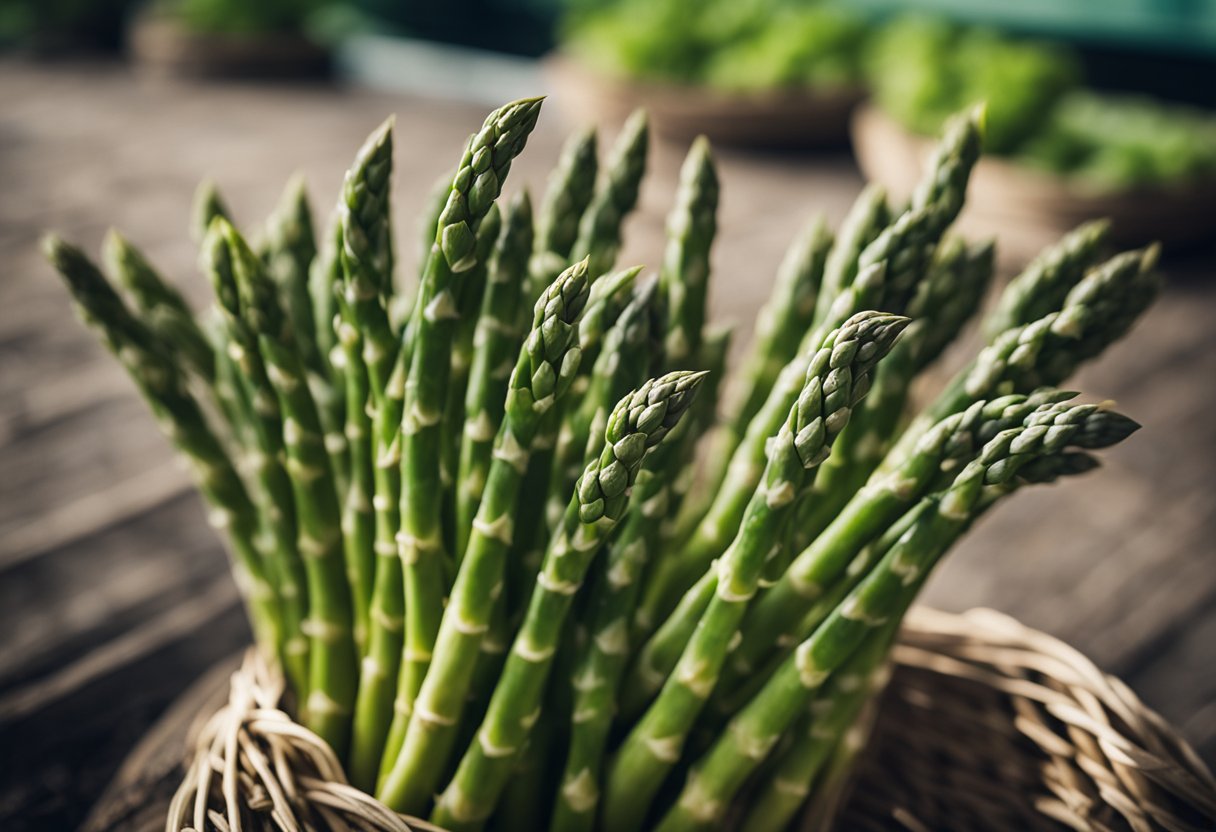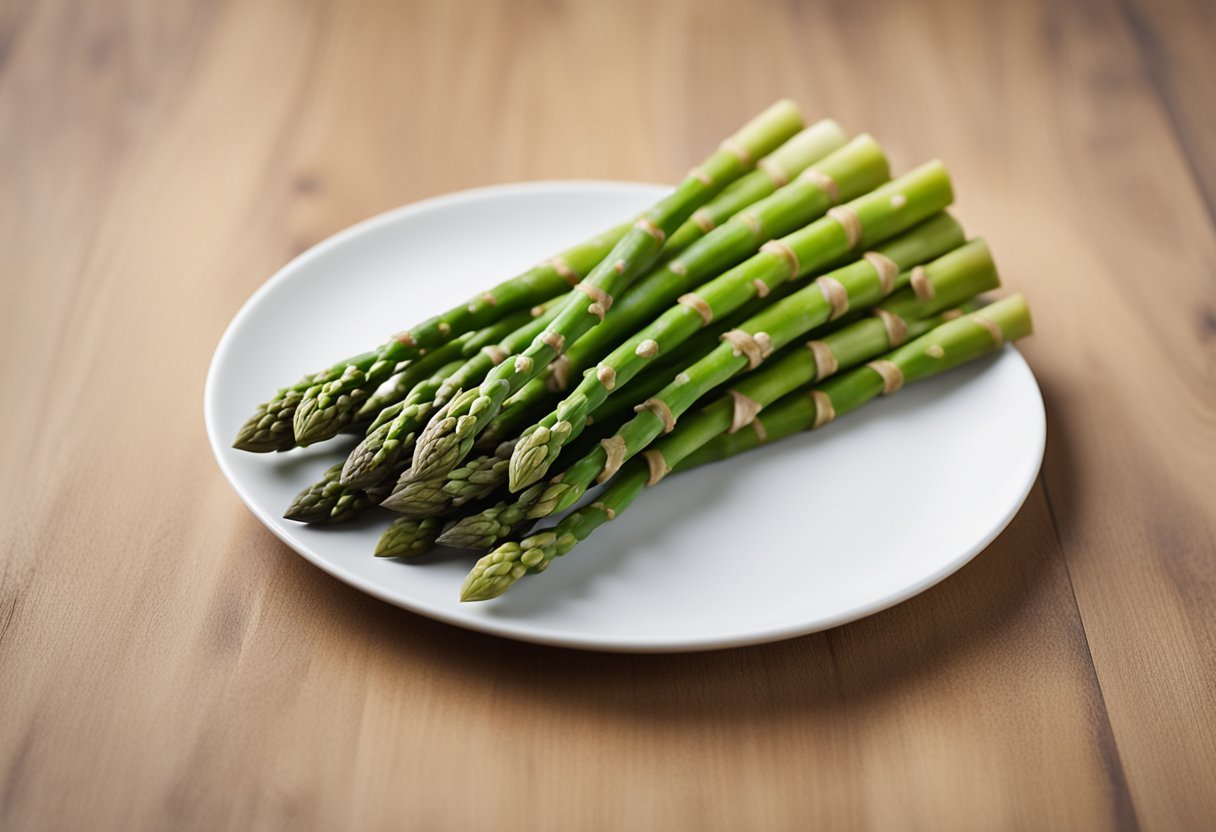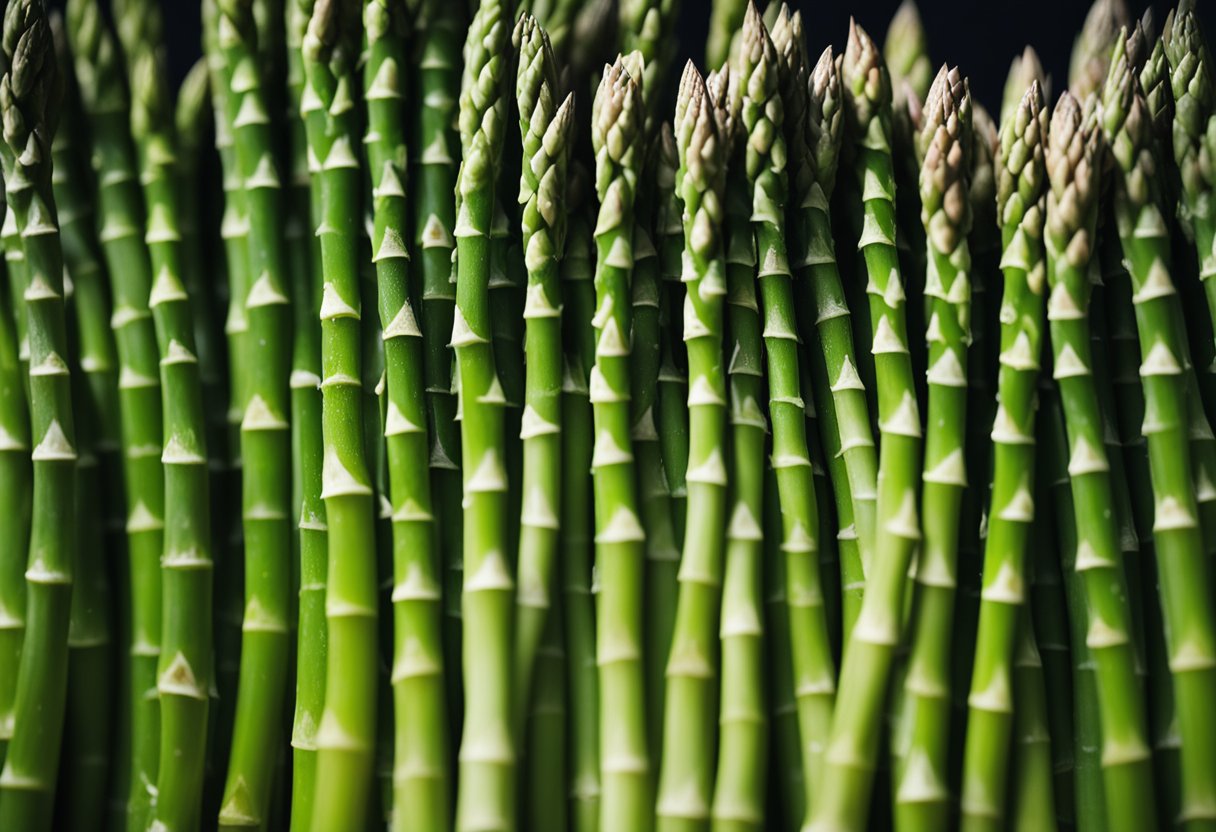Asparagus is a vegetable that has been enjoyed for centuries for its unique flavor and nutritional benefits.
However, some people may wonder whether asparagus is really a vegetable or something else entirely. The answer is clear: asparagus is a vegetable, and a highly nutritious one at that.

Asparagus is a member of the lily family, and its young shoots are harvested and eaten as a vegetable. While it is often classified as a “luxury vegetable” due to its high cost, asparagus is actually quite versatile and can be used in a variety of dishes.
From soups and salads to stir-fries and pasta dishes, asparagus is a popular ingredient in many cuisines around the world.
Key Takeaways
- Asparagus is a vegetable that is highly nutritious and versatile.
- It is a member of the lily family and is harvested for its young shoots.
- Asparagus can be used in a variety of dishes and is a popular ingredient in many cuisines.
Is Asparagus a Vegetable

Asparagus is a vegetable that is widely cultivated and enjoyed around the world. It is a member of the Asparagaceae family and is scientifically known as Asparagus officinalis.
The plant is a perennial and produces edible shoots that are harvested in the spring.
Asparagus is commonly referred to as garden asparagus or sparrow grass. Its young shoots are used as a spring vegetable and are known for their unique and delicious flavor.
Asparagus is a popular vegetable that is enjoyed in many different ways, including raw, boiled, steamed, grilled, roasted, or air-fried.
While asparagus is often considered a vegetable, it is technically a member of the Lily family, which also includes onions and garlic. However, it is still generally considered a vegetable due to its culinary uses and nutritional properties.
Asparagus is a nutrient-dense vegetable that is low in calories and high in vitamins and minerals. It is a good source of fiber, folate, vitamins A, C, E, and K, as well as minerals such as iron, calcium, and potassium.
Asparagus is also rich in antioxidants, which can help protect the body against damage from free radicals.
In conclusion, asparagus is a vegetable that is widely enjoyed for its unique flavor and nutritional properties.
While it is technically a member of the Lily family, it is still generally considered a vegetable due to its culinary uses and nutritional benefits.
Types of Asparagus
Asparagus comes in different varieties, each with its unique characteristics and flavor profile. Here are some of the most popular types of asparagus:
Green Asparagus
Green asparagus is the most common type of asparagus and is available year-round. It has a bright green color and a slightly bitter taste.
Green asparagus is the most flavorful of all asparagus varieties and is perfect for roasting, grilling, or sautéing. It is also rich in vitamins A, C, and K, making it a nutritious addition to any meal.
White Asparagus
White asparagus is grown underground, which prevents it from producing chlorophyll, giving it a pale color. It has a mild flavor and a tender texture, making it a popular ingredient in soups, stews, and salads.
White asparagus is also low in calories and high in fiber, making it an excellent choice for those watching their weight.
Purple Asparagus
Purple asparagus has a sweeter taste and a more tender texture than green asparagus. It is also high in antioxidants, making it a healthy addition to any diet.
Purple asparagus is perfect for roasting or grilling, and its vibrant color makes it a beautiful addition to any dish.
Overall, asparagus is a versatile and nutritious vegetable that comes in different varieties. Whether you prefer green, white, or purple asparagus, each type has its unique flavor and nutritional benefits.
Nutritional Profile of Asparagus

Asparagus is a nutrient-dense vegetable that is low in calories and high in vitamins and minerals. It is a great source of fiber, protein, and other essential nutrients that are important for maintaining overall health.
Vitamins in Asparagus
Asparagus is an excellent source of vitamins, particularly vitamin C, vitamin K, and vitamin A. One cup of cooked asparagus contains about 20% of the recommended daily intake of vitamin C, which is important for maintaining a healthy immune system.
Vitamin K is essential for blood clotting and bone health, and asparagus provides about 70% of the recommended daily intake in one cup. Vitamin A is important for maintaining healthy eyes and skin, and asparagus provides about 20% of the recommended daily intake in one cup.
Minerals in Asparagus
Asparagus is also a good source of minerals, including calcium, phosphorus, magnesium, zinc, copper, and manganese. Calcium and phosphorus are important for maintaining strong bones and teeth, while magnesium is important for muscle and nerve function.
Zinc is essential for immune function and wound healing, while copper is important for the production of red blood cells. Manganese is important for bone health and the metabolism of carbohydrates and protein.
Fiber and Protein Content
Asparagus is a good source of both fiber and protein. One cup of cooked asparagus contains about 3 grams of fiber and 4 grams of protein.
Fiber is important for maintaining digestive health and can help lower cholesterol levels, while protein is important for building and repairing tissues in the body.
Overall, asparagus is a nutritious vegetable that provides a wide range of vitamins, minerals, fiber, and protein. Incorporating asparagus into your diet can help you meet your daily nutrient needs and maintain good health.
Health Benefits of Asparagus
Asparagus is a nutrient-packed vegetable that offers a range of health benefits. In this section, I will discuss some of the ways that asparagus can positively impact your health.
Asparagus and Heart Health
Asparagus is rich in antioxidants, which can help reduce the risk of heart disease. The antioxidants in asparagus help to prevent the oxidation of LDL cholesterol, which can lead to the buildup of plaque in the arteries.
This buildup can increase the risk of heart attack and stroke. Asparagus can also help to lower blood pressure, which is another risk factor for heart disease.
Asparagus and Bone Health
Asparagus is a good source of vitamin K, which is essential for bone health. Vitamin K helps to activate proteins that are involved in bone mineralization, which is the process of depositing minerals like calcium and phosphorus into the bones.
Asparagus is also rich in other nutrients that are important for bone health, including calcium and magnesium.
Asparagus and Digestion
Asparagus is high in fiber, which is important for maintaining a healthy digestive system. Fiber helps to keep the digestive system moving smoothly and can help to prevent constipation.
Asparagus also contains prebiotics, which are a type of fiber that feeds the beneficial bacteria in the gut. This can help to improve gut health and reduce the risk of certain digestive disorders.
Asparagus and Weight Loss
Asparagus is low in calories and high in fiber, which makes it a great food for weight loss. The fiber in asparagus helps to keep you feeling full, which can reduce your overall calorie intake.
Asparagus is also a good source of protein, which can help to keep you feeling full for longer periods of time.
Asparagus and Pregnancy
Asparagus is a good source of folate, which is essential for a healthy pregnancy. Folate helps to prevent birth defects in the brain and spine, and it is important for the development of the baby’s nervous system.
Asparagus is also rich in other nutrients that are important for a healthy pregnancy, including vitamin C and vitamin A.
In summary, asparagus is a nutrient-packed vegetable that offers a range of health benefits. It can help to reduce the risk of heart disease, improve bone health, support digestion, aid in weight loss, and promote a healthy pregnancy.
Culinary Uses of Asparagus
Asparagus is a versatile vegetable that can be used in a variety of dishes. Here are some popular ways to use asparagus in the kitchen.
Asparagus in Salads
Asparagus can add a fresh and crunchy texture to salads. To prepare asparagus for a salad, trim off the woody ends and cut the spears into bite-sized pieces.
Blanch the asparagus in boiling water for 2-3 minutes, then transfer to a bowl of ice water to stop the cooking process. Drain the asparagus and toss it with your favorite salad greens, such as arugula or spinach. Top with a light vinaigrette dressing and some shaved parmesan cheese.
Asparagus in Pasta
Asparagus can also be a delicious addition to pasta dishes. Cook the pasta according to package instructions and reserve some of the pasta water. In a separate pan, sauté chopped garlic and asparagus spears in olive oil until tender.
Add the cooked pasta and some of the reserved pasta water to the pan and toss to combine. Finish with a squeeze of lemon juice and some grated parmesan cheese.
Asparagus with Hollandaise Sauce
Asparagus is a classic pairing with hollandaise sauce. To make hollandaise sauce, whisk together egg yolks, lemon juice, and melted butter in a heatproof bowl set over a pot of simmering water. Continue whisking until the mixture thickens and becomes creamy.
Season with salt and cayenne pepper to taste. Blanch the asparagus and serve it with the hollandaise sauce drizzled over the top.
Overall, asparagus is a delicious and nutritious vegetable that can be used in a variety of dishes. Whether you’re adding it to a salad, tossing it with pasta, or serving it with hollandaise sauce, asparagus is a versatile ingredient that can elevate any meal.
Growing Asparagus
Asparagus is a delicious and nutritious vegetable that can be grown in your own backyard. Growing asparagus requires a bit of patience and planning, but the rewards are well worth the effort. In this section, I will cover the basics of planting, harvesting, and storing asparagus.
Planting Asparagus
Before planting asparagus, it is important to choose the right location. Asparagus prefers well-drained soil and full sun.
It is best to plant asparagus in the spring, as soon as the soil can be worked. Asparagus can be grown from seeds or crowns. Crowns are the most common way to grow asparagus as they are more reliable and produce a harvest more quickly.
To plant asparagus crowns, dig a trench that is about 8 inches deep and 12 inches wide. Space the crowns about 18 inches apart in the trench and cover them with about 2 inches of soil.
As the asparagus grows, gradually fill in the trench with soil until it is level with the ground. Be sure to keep the area around the asparagus free of weeds.
Harvesting Asparagus
Asparagus can be harvested in the second or third year after planting. To harvest, snap off the spears when they are about 6 to 8 inches tall and before the tips start to open up.
Harvesting should be done every two to three days during the peak season. Stop harvesting when the spears become thin and the tips start to open up.
Storing Asparagus
Freshly harvested asparagus can be stored in the refrigerator for up to a week. To store asparagus for longer periods, blanch the spears in boiling water for 2 to 3 minutes, then immediately transfer them to an ice bath to stop the cooking process.
Once cooled, drain the spears and store them in airtight containers in the freezer.
In conclusion, growing asparagus requires a bit of patience and planning, but the rewards are well worth the effort. By following these simple steps for planting, harvesting, and storing asparagus, you can enjoy this delicious and nutritious vegetable all season long.
Potential Risks and Side Effects
Asparagus is generally considered safe to consume in moderate amounts. However, there are a few potential risks and side effects that may be worth considering.
Sodium Content
Asparagus is a low-sodium food, making it a great option for those who are watching their sodium intake.
However, it is important to note that some cooking methods, such as boiling, can cause asparagus to absorb more sodium. If you are on a low-sodium diet, it may be best to opt for steaming or roasting your asparagus instead.
Diuretic Properties
Asparagus is a natural diuretic, meaning it may increase urine production and help flush excess fluid from the body.
While this can be beneficial for those with edema or high blood pressure, it may also lead to more frequent urination. If you notice an increase in urination after consuming asparagus, don’t worry – it’s completely normal.
Bowel Movements
Asparagus is high in fiber, which can help promote regular bowel movements and prevent constipation. However, consuming too much fiber too quickly can also cause bloating, gas, and diarrhea.
If you are new to eating asparagus or have a sensitive digestive system, it may be best to start with small amounts and gradually increase your intake over time.
Other Considerations
In rare cases, asparagus may cause an allergic reaction in some individuals. Symptoms of an allergic reaction may include hives, itching, swelling, and difficulty breathing.
If you experience any of these symptoms after consuming asparagus, seek medical attention immediately.
Additionally, asparagus contains asparagusic acid, a compound that is broken down into sulfur-containing compounds during digestion. These compounds may give your urine a strong odor, which is completely normal and harmless.
Overall, asparagus is a nutritious and delicious vegetable that can be enjoyed as part of a healthy diet. However, it is important to be aware of these potential risks and side effects and consume asparagus in moderation.
Frequently Asked Questions

What is the botanical name for asparagus?
The botanical name for asparagus is Asparagus officinalis. It belongs to the family Asparagaceae.
What are some medicinal uses of asparagus?
Asparagus has been used for centuries in traditional medicine for its diuretic, anti-inflammatory, and antioxidant properties. It is also believed to have anti-cancer properties and may help to lower blood pressure and support healthy digestion.
What are the benefits of eating asparagus?
Asparagus is a low-calorie vegetable that is high in fiber, vitamins, and minerals. It is a good source of vitamin K, folate, and vitamin C. Asparagus is also rich in antioxidants and may help to reduce inflammation in the body.
What are some delicious asparagus recipes?
Asparagus can be enjoyed in a variety of ways, from roasted or grilled to sautéed or steamed. Some delicious recipes include asparagus risotto, grilled asparagus with lemon and garlic, and asparagus and mushroom quiche.
Is asparagus considered a vegetable in cooking?
Yes, asparagus is considered a vegetable in cooking. It is commonly used in a variety of dishes, from salads to soups to main courses.
Does asparagus have any aphrodisiac properties?
While asparagus has been rumored to have aphrodisiac properties, there is no scientific evidence to support this claim. However, asparagus is a nutritious and delicious vegetable that can be enjoyed as part of a healthy diet.







